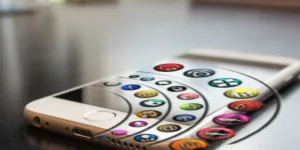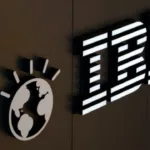Quick, grab your smartphone. Start counting. How many apps appear on your screen?
If you’re like the average American, you probably tallied between 60 and 90.
That count will expand dramatically if present trends hold. Users acquired 178 billion new apps in 2017. Only a year later, global app downloads had eclipsed 200 billion. By 2020, industry analysts expect users to add 258 billion apps to their smartphones — an increase of almost 50% in only five years.
Those numbers reflect a larger trend: These days, we’re doing more business using digital platforms. Wonder what today’s weather will be? Want to make a purchase? Need to navigate your way to a new restaurant (or get a ride there)? Curious about what your friends are doing? There’s an app for that. (There are even apps for those of us who check our smartphones too much, ironically enough.)
In addition to these more familiar functions, app developers are pioneering access to services long thought off-limits to these platforms. Thanks to their paradigm-shifting innovations, new powers now rest at users’ fingertips.
1. FarmSmart
Since 2014, severe drought has devastated Kenya. Millions are suffering from food insecurity. Malnutrition and starvation stalk the land.
Inadequate rainfall is only the symptom of a deeper problem this dry spell is exposing: poor soil quality due to intensive, unsustainable farming practices.
As in the rest of Africa, nearly three in five Kenyans are engaged in agriculture, but there are huge gaps in access to education about best farming practices. What if an AI-driven app could empower them with advice on sustainable growing, crop productivity, and market insights?
That’s the promise of FarmSmart, a collaborative venture between ag experts and London-based consulting firm Amido. It’s a one-stop platform available free to smallholder farmers looking to increase the capacity of their operations. Once users download the app and enter some basic information, the app guides them through every step of the growing process, from planting to selling crops. Networked users can communicate insights with each other through the platform.
We brand lots of apps “life-changing.” Here’s one program that lives up to that billing — at least for the millions of Africans trying to farm their land sustainably.
2. Too Good to Go
Did you know we waste a third of all the food we produce annually?
If we’re going to feed a global population of 9 billion by midcentury, we’ve got to find a way to reduce that loss.
In Europe and North America, waste happens all the time in restaurants, marketplaces, and refrigerators. Purveyors of food supply more than customers purchase and consumers buy more than they end up eating. This surplus gets discarded.
If there was a simple way to connect consumer audiences with unsold food, we could reduce loss. Apps like Danish startup Too Good to Go are starting to close this efficiency gap. Its download allows vendors to advertise unsold food — often at a discount — to eco-conscious consumers using the app.
With millions of users across 14 countries, it’s saved 28.4 million meals from loss already. Launched in 2016, this one little app is already making a big difference in foodways across Europe.
3. Nurx
Unlike the apps on our smartphone screens, our healthcare system doesn’t always offer an optimal experience.
Finding the right physician can be a challenge. Scheduling an appointment could involve long wait times. Costs tend to be high. Nothing guarantees you’ll be treated quickly and compassionately. And sorting out the details of testing and prescriptions can be tedious.
This becomes a real nightmare when it comes to birth control. We deserve better choices, more control, and greater freedom than the current system affords us. That’s the premise of Nurx, an app that’s making reproductive health simpler and more accessible. Once patients download the app, they can consult with a provider or request medication directly. A board-certified clinician in the Nurx network reviews the request and writes a prescription if clinically appropriate.
Once approved, all medications are shipped free of charge in discreet packaging. Every prescription includes unlimited messaging with a medical provider for 12 months. Skeptics might wonder if it’s safe to get birth control through an app. Researchers from Harvard University and the University of California, Davis medical schools recently put this proposition to the test. Their findings? Telemedicine platforms like Nurx weren’t just safe — they actually offered superior care to patients than traditional clinics.
We use an ever-increasing array of apps to do everything from checking the news to entertaining ourselves. Now, a new wave of innovation is allowing us to do more than scroll the headlines or listen to music. Thanks to pioneers like FarmSmart, Too Good to Go, and Nurx, we’re taking control of our lives in ways we never before imagined. That’s the sign of a very bright future for apps beyond download numbers.








